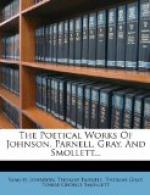Parnell first visited London in 1706; and from that period till his death, scarcely a year elapsed without his spending some time in the metropolis. He seems to have had as intense a relish of London life as Johnson and Boswell exhibited in the next age. So soon as he had collected his rents, he hied to the capital, and there enjoyed himself to the top of his bent. He jested with the Scriblerus Club. He quaffed now and then with Lord Oxford. He varied his round of amusements by occasional professional exhibitions in the pulpits of Southwark and elsewhere,—made, we fear, more from a desire to display himself, than to benefit his hearers. Still his sermons were popular; and he entertained at one time the hope,—a hope blasted by the death of Queen Anne,—of being preferred to a city charge. So soon as each London furlough was expired, he returned to Ireland, jaded and dispirited, and there took delight in nursing his melancholy; in pining for the amusements of the metropolis; in shunning and sneering at the society around him; and in abusing his native bogs and his fellow-countrymen in verse. This was not manly, far less Christian conduct. He ought to have drowned his recollections of London in active duty, or in diligent study; and if he found society coarse or corrupt, he should have set himself to refine and to purify it. But he seems to have been a lazy, luxurious person—his life a round of selfish rapture and selfish anguish,—in fact, ruined by his independent fortune. Had he been a poorer, he had probably been a happier man. He was not, moreover, of that self-contained cast of character, which can live on its own resources, create its own world, and say, “My mind to me a kingdom is.”
In 1712 he lost his wife, with whom he appears to have lived as happily as his morbid temperament and mortified feelings would permit. This blow deepened his melancholy, and drove him, it is said, to an excessive and habitual use of wine. In the same year we find him in London, brought out once more under the “special patronage” of Dean Swift, who had quite a penchant for Parnell, and who wished, through




